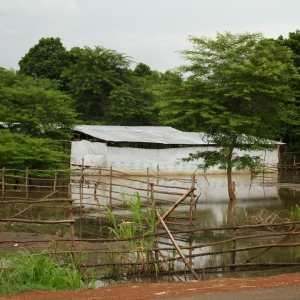Federal Water Tap, May 11: Senate Committee Advances Two Water Infrastructure Bills
The Rundown
Water infrastructure bills move swiftly through a Senate committee. A federal judge blocks oil and gas lease sales in Montana over groundwater concerns. USAID sends food aid to people affected by a dam break in Uzbekistan. USGS researchers find microplastics in Lake Mead. California water dispute results in more letters from congressional representatives and administration officials. EPA identifies producers of carbon dioxide for water utilities that need it for treating water. EPA’s internal watchdog begins an investigation of the agency’s coronavirus response. And lastly, a U.S. Civil Rights Commission advisory group holds a hearing on water access in Massachusetts.
“Certainly, none of those things — life, liberty, the pursuit of happiness — are possible without access to clean water, whether it is to wash our hands or to drink. We can’t have life without clean water to drink. The Covid-19 pandemic has reminded us of that too — just how important it is to have access to clean water to wash our hands and soap to wash our hands.” — Sen. Tom Carper (D-DE) speaking about the importance of water systems. His committee advanced two water infrastructure bills last week.
By the Numbers
$100,000: Aid provided to people in Uzbekistan’s Sirdaryo region who were affected by a dam break. Some 70,000 people in the region were uprooted by flood waters on May 1, when the three-year-old Sardoba dam ruptured. The aid is for food and other household supplies. (USAID)
News Briefs
Water Infrastructure Bills Advance
Acting swiftly and by unanimous vote, a Senate committee approved two water infrastructure bills that, combined, would authorize funding for the nation’s drinking water and sewage systems, as well as provide money for ports, dams, and flood control structures.
The America’s Water Infrastructure Act is a wide-ranging bill that authorizes $17 billion in Army Corps of Engineers water projects, including flood studies, locks, dams, and levees.
The Drinking Water Infrastructure Act reauthorizes a popular low-interest loan program. It also sets a timeline for the U.S. Environmental Protection Agency to regulate PFOA and PFOS in drinking water. The agency made a draft determination earlier this year that such standards are necessary.
The House still needs to introduce its version of the bills.
Oil and Gas Leases on Hold
A federal judge froze nearly 300 oil and gas lease sales in Montana, ruling that the federal Bureau of Land Management did not adequately analyze the leases’ potential impacts on groundwater, Montana Public Radio reports.
Two environmental groups and two Montana landowners filed the lawsuit, which applies to lease sales that occurred from December 2017 to March 2018. The Bureau could still proceed with the sales after redoing its analysis.
More California Water Letters
Six House Republicans representing California districts sent a letter to Gavin Newsom, the governor of their state, with two requests: that he drop a lawsuit aimed at intervening in the pumping of water across the state and stop pursuing a court injunction with the same end goal.
The state sued the federal government in February, arguing that the federal government’s biological opinions, finalized the same month, put endangered fish species in the contested Sacramento-San Joaquin delta at risk. The biological opinions inform the operation of massive pumps that move water from the delta to farms and cities to the south.
“Without changing course, your Administration’s actions will ensure years of litigation and water supply uncertainty,” the letter states.
Another letter was from Brenda Burman, the head of the Bureau of Reclamation, which operates the Central Valley Project, a large water delivery apparatus.
Writing to Sen. Dianne Feinstein (D-CA), Burman said that the Bureau is willing to work with state agencies in operating both state and federal water delivery systems. But, Burman claimed, California has decided “to embrace the tactics of litigious interest groups,” a move that will stymie work to update system operations.
Studies and Reports
CO2 Suppliers List
The EPA published a list of food-grade producers and suppliers of carbon dioxide.
Water utilities use the gas in water treatment for the purpose of balancing pH. A few utilities had mentioned trouble acquiring carbon dioxide supplies due to the shutdown of ethanol facilities.
Microplastics in Lake Mead
U.S. Geological Survey researchers took water and sediment samples at nine sites around Lake Mead and Lake Mohave, a smaller downstream water body, to investigate the prevalence of microplastic particles in the two Colorado River reservoirs.
Twenty-one fish and 21 quagga mussels were also sampled for microplastics, in addition to sediment cores.
The most abundant particle type that was found were fibers. Microplastics are defined as those smaller than 5 millimeters in diameter.
More microplastics were found at sites that had higher human influence, either through water discharges or boating.
Microplastics were “present in water and sediment throughout the study area and that ingestion by aquatic organisms was common,” the study concludes, noting that sample sizes were small and that additional research is needed into the ecological effects.
In context: ‘It’s Raining Plastic’: Researchers Find Microscopic Fibers in Colorado Rain Samples
On the Radar
Civil Rights Commission Hearing on Water Issues in Massachusetts
The Massachusetts advisory committee to the U.S. Commission on Civil Rights will hold a conference call this month to discuss water equity issues in that state.
The call will be on May 19 at noon Eastern.
The dial-in number is 1-866-575-6539 and the conference ID is 3059676.
The agenda and related documents will be posted here, when available.
EPA Coronavirus Response Investigation
The EPA Office of the Inspector General says that it will begin an investigation into the agency’s coronavirus response.
The internal watchdog will examine the effect of the pandemic on the agency’s programs and operations, as well as investigate the agency’s enforcement and oversight of environmental laws during the crisis.
Federal Water Tap is a weekly digest spotting trends in U.S. government water policy. To get more water news, follow Circle of Blue on Twitter and sign up for our newsletter.
Brett writes about agriculture, energy, infrastructure, and the politics and economics of water in the United States. He also writes the Federal Water Tap, Circle of Blue’s weekly digest of U.S. government water news. He is the winner of two Society of Environmental Journalists reporting awards, one of the top honors in American environmental journalism: first place for explanatory reporting for a series on septic system pollution in the United States(2016) and third place for beat reporting in a small market (2014). He received the Sierra Club’s Distinguished Service Award in 2018. Brett lives in Seattle, where he hikes the mountains and bakes pies. Contact Brett Walton





Leave a Reply
Want to join the discussion?Feel free to contribute!